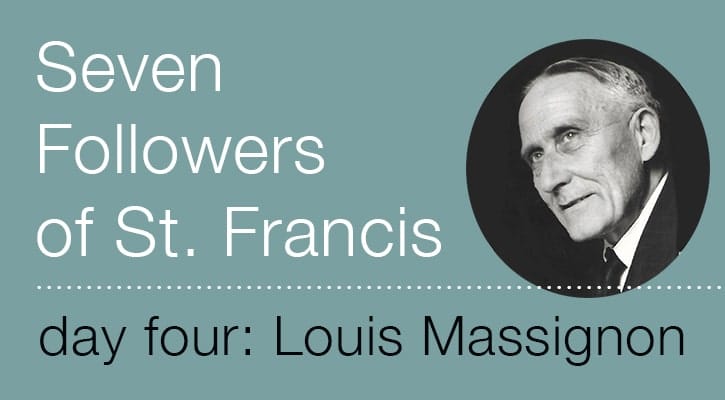Third Order Franciscan, Prophet of Dialogue
(1883–1962)
Louis Massignon, a French scholar, played a key role in promoting the cause of Catholic-Muslim dialogue. The seeds of his vocation were planted in his youth and his avid interest in Arab culture. While conducting research in Mesopotamia he was arrested and charged as a spy. During his captivity, he received a profound mystical experience, which brought him to an overwhelming sense of God.
This prompted an ardent return to his Catholic roots. But he was also deeply affected by the experience of Muslim piety and vowed to devote his life to increasing understanding between these two religious traditions, both heirs of the faith of Abraham. (He was also deeply influenced by his friendship with the desert hermit Blessed Charles de Foucauld.) In 1931 he became a Franciscan tertiary, taking the name “Ibrahim” (the Arabic form of Abraham).
A key point of reference for Massignon was God’s visit to Abraham as a stranger in the form of three angels. By providing hospitality for God in our hearts, he wrote, “we enter the path of mystical union.” He considered his encounter with Muslim spirituality (one of the three Abrahamic faiths) as a form of “sacred hospitality.” At an abandoned Franciscan church in Egypt where St. Francis had met Sultan al-Malik al-Kamil, Massignon made a vow, offering his life for the Muslims, “not so they would be converted, but so that the will of God might be accomplished in them and through them.”
Later in life, Massignon became a Melkite Greek Catholic and was ordained a priest, permitting him to celebrate the Mass in Arabic according to the Byzantine Rite liturgy. A follower of Gandhian nonviolence, he supported efforts to promote peace in the Middle East and for a peaceful resolution of the war in Algeria. For the sake of sacred hospitality, he became an outspoken advocate for Muslim refugees in France. He died on October 31, 1962.

Questions for Reflection
- Louis Massignon followed in the footsteps of St. Francis by promoting Catholic-Muslim dialogue. In what ways can we build bridges instead of walls?
- Political infighting, violence, and aggression plague our country and our world. How can we be messengers of peace in the face of conflict?
- We must promote peace in the world, but first we must foster peace in our own hearts. How can we do that? How can prayer calm our own inner storms?
“Man is not made for works of external mercy, but first of all to worship the divine guest in his heart, in the present moment.”
Louis Massignon







